
Mr. MOOC: Ethan Berl '14 gets his fill of education, in person and online
Ethan Berl ’14 will never have to ask himself why he didn’t take more courses at Princeton when he had the chance.
The computer science major took a staggering six courses last fall and another half-dozen this spring. But that’s only half of it. The 21-year-old junior got hooked last summer on the cornucopia of free courses now offered online and signed up for a dozen through Coursera, with which Princeton is experimenting, and other outfits offering the so-called Massive Open Online Courses (MOOCs).
Berl successfully completed 10 of those classes in such fields as quantum mechanics, machine learning, and genetics. None was taught by a Princeton professor.
Berl and Austin Walker ’13 won the $20,000 Howard Cox ’64 Entrepreneurship Grand Prize in TigerLaunch, a Princeton Entrepreneurship Club competition held last month, for a program called WebReduce that would help companies market unused time on their computers for data-crunching.
He has twice interrupted his schooling for a year — after graduating from the University Laboratory High School in Urbana, Illinois, and after sophomore year at Princeton — to work with tech start-ups in Champaign-Urbana and in San Francisco. The red-headed Berl has other talents, too. At the University Laboratory High School in Urbana, he was named to the all-state chorus — he’s a tenor — played trumpet in a jazz ensemble, and won an award for composing a piano fantasy.
So how did he find time to cram in so many Princeton courses on top of everything else? He admits that “it was very stressful, but I got through it and did pretty well in all my classes …. For Princeton I actually sat in class 22 hours, then probably spent at least twice that outside of class doing homework and studying.” That’s 66 hours. Subtract the six hours he sleeps each night, and there’s 60 left for everything else. He estimates he spent three to five hours a week on each MOOC or more if programming was involved “because you had to bang your head against the wall until you got your code to work.”
One of the courses he dropped was Probabilistic Graphical Models taught by Daphne Koller, the Stanford computer scientist who co-founded Coursera. It actually was one of the best he found online, Berl says, but “I got too busy. My Princeton work has to come first.” But he intends to take it again.
His favorite class last semester was Internet and Technology Policy in the Woodrow Wilson School. “The lectures were pretty good but what was really, really valuable to me for was the discussions that we had in class with the other students. That’s something you can’t replace very well online.” He favors the idea of opening up even more time for class discussions by putting lectures online.
After Princeton Berl intends to head back to Silicon Valley and eventually he wants “to start my own company in the neuroscience market. In 10 to 20 years there’s going to be a lot of computer chips inside people’s heads …. I want to be on the forefront” of making that safer and better understood.
And what will the Princeton of tomorrow look like?
“Subjects that don’t even exist today will be the most important and sought after subjects in 20 or 30 years. Whole new fields are going to be created. It’s very hard to judge where the focus and culture of the school is going to be.”






No responses yet